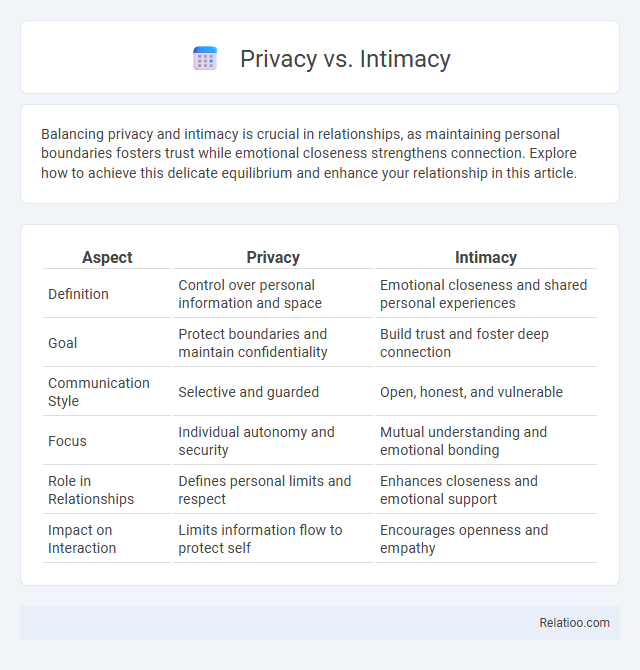Balancing privacy and intimacy is crucial in relationships, as maintaining personal boundaries fosters trust while emotional closeness strengthens connection. Explore how to achieve this delicate equilibrium and enhance your relationship in this article.
Table of Comparison
| Aspect | Privacy | Intimacy |
|---|---|---|
| Definition | Control over personal information and space | Emotional closeness and shared personal experiences |
| Goal | Protect boundaries and maintain confidentiality | Build trust and foster deep connection |
| Communication Style | Selective and guarded | Open, honest, and vulnerable |
| Focus | Individual autonomy and security | Mutual understanding and emotional bonding |
| Role in Relationships | Defines personal limits and respect | Enhances closeness and emotional support |
| Impact on Interaction | Limits information flow to protect self | Encourages openness and empathy |
Defining Privacy and Intimacy
Privacy involves controlling access to your personal information and maintaining boundaries that protect your autonomy and security. Intimacy, by contrast, refers to the deep emotional connection and trust shared between individuals, often characterized by openness and vulnerability. Understanding the balance between privacy and intimacy is essential for nurturing healthy relationships while safeguarding your personal space.
Historical Evolution of Privacy and Intimacy
The historical evolution of privacy and intimacy reveals shifting societal norms and technological advancements impacting personal boundaries. In ancient societies, privacy was limited, with communal living and shared resources, whereas intimacy was closely tied to familial and tribal bonds, reflecting collective identities. Your understanding of these concepts today stems from centuries of legal, cultural, and technological changes that define how individuals protect personal space and cultivate close relationships in modern contexts.
The Psychological Importance of Personal Boundaries
Personal boundaries are crucial for maintaining a healthy balance between privacy and intimacy, ensuring emotional well-being and self-respect. Respecting these boundaries allows you to establish trust and safety in relationships, preventing emotional overexposure or discomfort. Clear personal boundaries support your psychological resilience by defining where your private space ends and intimacy begins.
Privacy in the Digital Age
Privacy in the digital age faces unprecedented challenges as personal data is constantly collected, stored, and shared across online platforms. Maintaining your privacy requires understanding the balance between intimacy and exposure, ensuring sensitive information remains secure while fostering meaningful connections. Advanced encryption technologies and strict data protection regulations are essential tools in safeguarding privacy against cyber threats and unauthorized surveillance.
How Intimacy Shapes Human Connections
Intimacy plays a crucial role in shaping human connections by fostering trust, emotional closeness, and a deeper understanding between individuals. Your personal experiences of intimacy influence the quality of relationships, enhancing communication and empathy while creating a safe space for vulnerability. Unlike privacy, which protects personal boundaries, intimacy actively builds bonds that strengthen social and emotional ties.
Cultural Perspectives on Privacy and Intimacy
Cultural perspectives on privacy and intimacy vary significantly, influencing how individuals perceive personal boundaries and social interactions. In collectivist societies, intimacy is often expressed communally, with less emphasis on personal privacy, whereas individualistic cultures prioritize privacy as a foundation for intimate relationships. Understanding these cultural differences is crucial for navigating privacy norms and fostering respectful interpersonal connections globally.
Balancing Privacy and Intimacy in Relationships
Balancing privacy and intimacy in relationships requires understanding that personal boundaries protect individual autonomy while fostering emotional closeness strengthens connection. Your ability to communicate openly about needs for space and vulnerability creates trust and deepens relational bonds. Prioritizing respect for each other's privacy alongside shared moments ensures a healthy, thriving partnership.
Privacy Invasion: Risks and Consequences
Privacy invasion poses significant risks including identity theft, emotional distress, and loss of trust, particularly when sensitive personal information is exposed. The consequences often extend beyond individual harm, affecting intimate relationships through breaches of confidentiality and undermining emotional safety. Legal and social repercussions may arise, emphasizing the critical need for robust privacy protections in both digital and physical environments.
Communication Strategies for Healthy Boundaries
Effective communication strategies for maintaining healthy boundaries involve clearly articulating personal needs and limits to foster mutual respect in relationships. Utilizing active listening and empathy enhances understanding, enabling individuals to balance privacy preferences with intimacy desires. Setting consistent, honest dialogues helps prevent boundary violations and supports emotional well-being while navigating the complexities of personal space and closeness.
Future Trends in Privacy and Intimacy
Emerging technologies like AI and IoT are reshaping the landscape where privacy and intimacy intersect, creating both opportunities and challenges for safeguarding personal boundaries. You must navigate enhanced encryption methods and evolving digital norms that prioritize user consent while enabling deeper emotional connections through virtual environments. Future trends emphasize balancing transparency with control to protect intimate experiences without compromising privacy in an increasingly connected world.

Infographic: Privacy vs Intimacy
 relatioo.com
relatioo.com